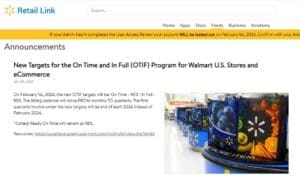
Walmart is reducing its requirements that suppliers’ shipments to them arrive on-time in-full. Since September of 2020, 98% has been Walmart’s OTIF requirement. Beginning on February 1st, the new OTIF targets became 90% for on-time and 95% for in-full. This was announced on the Retail Link portal for suppliers on January 30th.
Walmart’s On-Time In-Full initiative is a compliance measure designed to ensure that freight arrives at a Walmart store or distribution center when it was supposed to, in the quantities expected. The goal of this for Walmart is to make sure that when customers go to the store, the goods they want to buy are on the shelf. Walmart fines suppliers whose goods arrive late or who have not shipped everything that they committed to ship. Walmart is not the only big retailer with OTIF requirements, but as the world’s largest retailer, and a company with stringent requirements, Walmart’s OTIF requirements are top of mind for consumer goods companies.
Russell Zuppo, a vice president for consulting services at Uber Freight, reports that in their customer base, Walmart suppliers are currently paying 0.16% of the cost of goods sold in fines to Walmart. Uber Freight is a major provider of managed transportation services.
The fines, Uber Freight reports, vary by the costs of the products being sold to Walmart. If a company short ships TVs, they are fined more than if they short ship soup, for example. But for many retailers, the fines are well in excess of $1 million per year. Cumulatively, the lack of delivery compliance costs has been estimated to cost consumer goods industry over a billion dollars per year.

Proving OTIF Remains Difficult
Many consumer goods suppliers have implemented real-time transportation visibility solutions. These solutions allow companies to prove that their goods arrived on-time. But Stephen Dyke, a senior executive at FourKites, says that gaining visibility to whether a shipment arrives on-time is not the tricky part. Proving that it arrived in-full is. FourKites is one of the largest providers of real-time transportation visibility solutions.
It is not enough to use GPS to track a truck. The visibility solution must be built in such a way that it can download order quantity and inventory data from a customer’s systems. Uber Freight is also able to track both on-time and in-full. Steve Barber, the senior vice president of platform at Uber Freight, explains how this is done.
When Uber Freight receives a purchase order, delivery order, or sales order – the type of order used varies depending on the customer’s ERP – that is what OTIF is measured against. Then many warehouse management systems have been configured to scan the barcodes on items as they are put onto a truck. That data then gets put into an advanced ship notice for the retailer. That ASN data also goes into the Uber Freight system which can then compare what was shipped to what was ordered.
“And so, we can compare what was actually put on that truck versus what was planned to go on that truck at the order level,” Mr. Barber explained. “We can track that information down to the actual delivery level, so once it delivers, we can see whether it delivered on-time.” In addition to normalizing data and data cleansing, this is a Big Data problem. It is clearly not an easy problem to solve.
Having good OTIF data can help prove that a company really has shipped on-time and in-full. But what if the shipments don’t achieve OTIF? At FourKites’ user conference, consumer goods executives talk about how they have used the visibility data to determine where shipments are being held up across their supply chain, dug into the root causes of the delays or short shipments, and implemented continuous improvement programs.
But even solving the in-full data problem doesn’t totally exempt consumer goods companies from OTIF fines. A retailer might report that goods arrived damaged, that some cartons arrived empty, or goods might be stolen on route. Nevertheless, achieving better OTIF compliance is a major reason that consumer goods companies work with both FourKites and Uber Freight.
















